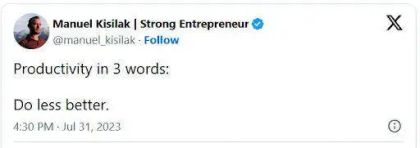How would you feel about doing nothing for 4 hours?
This has been part of a coaching program I joined in 2020:
Sit in silence, with nothing to do:
- No books to read
- No laptop to work
- No people to talk to
- No phones to scroll on
- Not even paper to write
Nothing but you, your thoughts and your emotions.
Would you be excited? Annoyed about missing potential revenue? Anxious because of the awaiting boredom?
Truth is, you’d probably try anything you can to avoid it.
In an infamous experiment, people were put in a room with two options: either do nothing or put their hand into a device that gives them a painful electroshock. 70% of men would choose the shock - after just 15 minutes!
But why does boredom hurt more than physical pain? And why should you care about it?
Truth is that the inability to be by yourself is one of your biggest stressors. It can:
- Lead to binging
- Make you miserable
- Destroy your productivity
Boredom is a superpower - for your health, business and happiness.
Continue reading to learn how to utilize it (without having to sit still for hours).
The source of all your problems?
“All of humanity's problems stem from the inability to sit in a room quietly” - Blaise Pascal
There are three major problems that result from being unable to be with yourself:
1 - Stress and poor health
Stress is the main reason why weight-loss is so hard for many entrepreneurs. If you don’t manage it well, excess stress leads to harmful coping strategies like:
- Binge eating
- Overworking
- Alcohol abuse
- Procrastination
- In extreme cases drug addictions
And no diet, workout or supplement will help you unless you take care of that.
To be able to manage your stress without these unhealthy strategies, you have to learn to be with yourself: Acknowledge your thoughts and emotions, and learn how to handle them. It’s the only way to stop these destructive coping mechanisms, and it requires stillness.
Let’s take Elizabeth as an example:
She was always busy, building her business and producing videos. But her drive had a cost: She couldn’t handle the stress and coped by overeating and drinking. No matter what she tried to lose weight, she’d gain it back.
She didn’t break that pattern through another diet. She did so by making time for herself. Doing nothing was hard for her because it challenged her identity as an achiever. But once she got at ease being just by herself, her need to overeat and drink vanished. On top of that, her finances got healthier as well!
Which brings us to the second problem…
2 - It costs you money
How long can you focus? 10 minutes? 30 minutes? One hour?
Well, the average attention span today is 8.25 seconds. That’s less than that of a goldfish! Poor focus is a financial handicap. In his book “Deep Work”, Cal Newport states that in today's economy, your attention is your superpower. Deep, mentally hard work takes extended time of uninterrupted focus. You’ll do terribly at it if your attention span is just 8 seconds.
Deepening your focus is the best way to get more done in less time.
When I did that 4 hours of silence for the first time, my focus was abysmal: I remember taking an entire day, just to do two client feedbacks! Today, I manage more in a two hour block of deep work compared to an entire week in 2020.
To boost your focus, your mind needs rest: Focusing is strenuous for your mind and you need rest to recharge. The best way is through boredom. It gives your brain space to connect information, leading to higher creativity. This is called the "Default Mode Network": It's responsible for those ideas you get out of nowhere when you're in the shower.
But focus isn’t the only thing that’s destroyed by being busy all the time:
3 - Unhappiness
“If you could just sit for thirty minutes and be happy, you are successful.” - Naval Ravikant
I used to avoid stillness like the plague:
- Netflix
- Eating
- The gym
- YouTube
- Overworking
- Video Games
- Doom Scrolling
- Drinking alcohol
I even used to put on music when I walked from the office to the toilet.
But the times I’ve avoided stillness, I’ve also been the most miserable. Truth is, you’ll never reach true happiness if you need external stimulation to feel good. You’ll feel dissatisfaction and a sense that something is always missing from your life.
So how do you fix this, without having to become a Zen monk?
By now, you know the importance of boredom for being able to thrive in your fitness and business. Since you can’t become a monk, you need methods to incorporate it into your everyday life.
For that, I will introduce you to the Mindful-Living-Framework. This framework allowed me to disengage from excessive coping behaviors, made me happier and 10x-ed my productivity. And it can do the same for you.
1) Stop multitasking
One of the biggest lies you've been told about productivity is that multi-tasking will help you get more done. In reality, multitasking leads to:
- Exhaustion
- Increased errors
- Reduced creativity
- Stress and anxiety
- Lower quality of work
It destroys your productivity, especially with deep work. Multitasking is also the opposite to being bored, which is why it’s vital to stop it.
When you “multitask”, you're not actually doing several things at once. Instead, you switch between tasks. Your brain needs time to adjust to new tasks, also called "attention residue". It can take up to 20 minutes to be fully focused again after switching tasks!
Therefore, you prolong the amount of time your task will take, and you'll need more time to clean up the mess you've created.
2) Remove distractions
Because it’s so easy to get distracted, it's more necessary than ever to live mindfully. While smartphone notifications, emails, or phone calls are the obvious ones, it goes deeper.
Everything that doesn't contribute to the life you want to build is a distraction:
- Overworking
- Unproductive habits
- Foods that don’t serve you
- Excessive worry or ruminating
- Saying “yes” when you actually want to say “no”
- Work you take on that doesn’t bring you ahead
Cutting distractions frees up time that you can spend productively or to be with yourself.
Also, become mindful of how you deal with “downtime” - periods of time with nothing to do. As a kid, I'd just stare into space when waiting at the doctor, airport or train station. Today, we're automated to pull out our smartphone as soon as there's two seconds without anything to do.
Next time you sit on a train or bus, observe how people keep themselves busy: Most glue to a screen, swiping through TikTok, news or WhatsApp.
Technology is great, but you have to be deliberate to create space without it. Otherwise, you’ll end up with a stressed-out brain and a goldfish-level attention span.
3) Deep rest
"If the grind doesn't sleep, the grind will stop."
One of the biggest lies you’ve been told is that rest is lazy. In fact, it’s the pillar of productivity. An overworked brain won’t stay quiet and can’t focus.
Here are the pillars I use to get quality rest:
- Sleep
- Journaling
- Good food
- Time in nature
- Quality social time
- Quality enjoyment
- Meditation (we’ll get to that)
Don’t expect a clear and calm mind if you’re permanently exhausted.
4) Meta-perspective
“You’re not your thoughts, you’re the thinker of your thoughts!”
This was my first learning from my mentor Jim Fortin, and it changed everything: Before, I was convinced my thoughts “owned” me due to them being so chaotic and overwhelming. But it was just me creating and feeding them.
If you ever feel “trapped” in your thoughts, recognize that you’re the one thinking them. You’re never stuck in thoughts. You have power over your thoughts! You think your thoughts, and you experience emotions, but they don’t define you. This realization will bring you a lot of peace. It allows you to differentiate yourself from your thoughts and emotions. This is important because when you start allowing yourself to be bored, painful ones might come up.
5) Schedule time with yourself
"Meditation is making time with yourself" - Jay Shetty
Plan some time in your day to be with yourself:
- Sit in a park and just observe
- Go for a quiet walk in nature
- Mindful breathing
- Journaling
- Meditation
- Sauna
Get in tune with your thoughts and feelings. Don’t try to wrestle with them, just observe. If thinking about this creates anxiety, it’s crucial to you. Meditation changes the structure of your brain: The Amygdala, a center of fear and stress, shrinks. The Prefrontal Cortex, a structure responsible for planning, focus and analytical thinking grows in volume.
And no, you’re not “too busy” to meditate - you’re avoidant. Commit to some sort of mindful practice - even if it’s just one minute per day. That’s how I built my meditation habit: I started with one minute and added a little bit every day.
Summary
Boredom is a superpower that will make you fitter, wealthier and happier. It will allow you to knock out deep work and reduce stress. Integrate the mindful living framework into your life. Stop multitasking, cut distractions and make time with yourself. I started with one minute per day and turned it into a habit. You will feel your happiness increase, your stress and desire to engage in bad habits decrease, and your productivity increase.
If you want to learn how to get your dream physique in 2 hours per week, without counting calories, endless cardio or fad diets, click this link to hop on a free 1:1 call with me.
